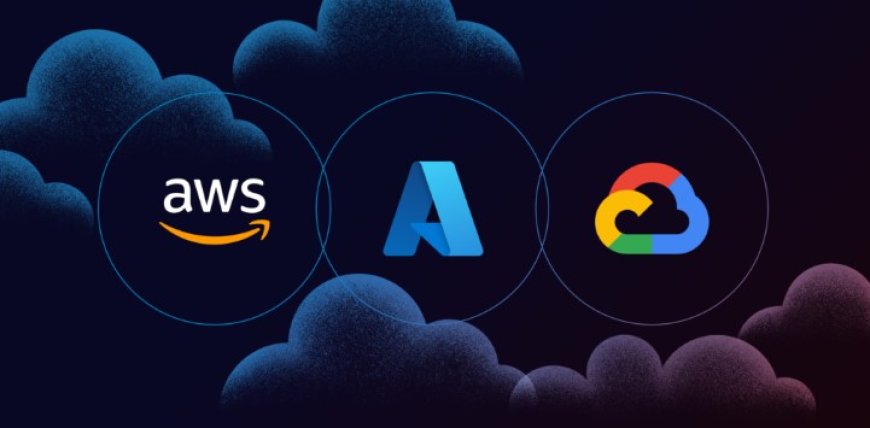Cloud Computing Basics: A Beginner’s Guide
Explore the top cloud service providers - AWS, Azure, and Google Cloud. Compare features, pricing, and performance to find the best fit for your business needs.

In the rapidly evolving landscape of cloud computing, organizations have a range of options when it comes to choosing a cloud service provider. Amazon Web Services (AWS), Microsoft Azure, and Google Cloud Platform (GCP) are three of the most prominent contenders in this space. We'll conduct an in-depth comparison of these top cloud service providers, helping you understand their strengths, offerings, and considerations for selecting the best fit for your organization's needs.
Amazon Web Services (AWS)
Amazon Web Services (AWS) stands as a pioneering force in the realm of cloud computing. Since its inception in 2006, AWS has emerged as a leader in the industry, driven by its expansive collection of services, global infrastructure, and unwavering commitment to innovation.
Service Offerings: AWS's service repertoire is nothing short of comprehensive. Covering an extensive spectrum of needs, it offers services such as Elastic Compute Cloud (EC2) for scalable computing power, Simple Storage Service (S3) for versatile storage options, Relational Database Service (RDS) for seamless database management, and Virtual Private Cloud (VPC) for secure networking. Notably, AWS has made significant strides in serverless computing with AWS Lambda, a powerful tool for event-driven applications, and boasts a robust Internet of Things (IoT) suite that caters to the burgeoning IoT landscape.
Global Reach: A key strength of AWS lies in its global reach. With data centers strategically scattered across regions around the world, AWS provides organizations with unparalleled access to resources, ensuring low-latency performance and exceptional availability on a global scale.
Community and Ecosystem: The vibrant AWS community and ecosystem add further appeal. With a vast and active user base, AWS fosters knowledge sharing, problem-solving, and collaboration. This community spirit is complemented by a rich assortment of third-party integrations and tools that enhance the functionality and versatility of the platform.
In essence, Amazon Web Services has earned its place as a frontrunner by delivering a comprehensive suite of services, a global infrastructure network, and a thriving community that collectively drive innovation and transformation in the world of cloud computing.
Microsoft Azure
Microsoft Azure, one of the leading cloud service providers, offers a comprehensive suite of cloud services that seamlessly integrate with Microsoft's software ecosystem. Launched by Microsoft, Azure is favored by enterprises seeking a cloud solution that complements their existing technologies. Azure's standout features include its hybrid capabilities, enterprise integration, and a diverse service portfolio.
Hybrid Capabilities: Azure's strength lies in its ability to bridge the gap between on-premises and cloud environments. This makes it an ideal choice for organizations looking to maintain a balance between existing infrastructure and cloud solutions. Azure's hybrid features facilitate smooth integration, allowing data and applications to flow seamlessly between on-premises data centers and the cloud.
Enterprise Integration: Microsoft Azure's tight integration with Microsoft's widely used applications such as Office 365 and Active Directory sets it apart. For enterprises already deeply invested in the Microsoft ecosystem, Azure offers a seamless experience, enabling teams to leverage familiar tools and workflows in a cloud environment.
Diverse Service Portfolio: Azure boasts a diverse set of services designed to cater to various business needs. From virtual machines and storage solutions to databases like Azure SQL Database and analytical tools like Azure Synapse Analytics, Azure covers a wide spectrum of IT requirements. Furthermore, Azure offers robust AI services through Azure AI, empowering organizations to harness the potential of artificial intelligence for innovation and efficiency.
Google Cloud Platform (GCP)
Google Cloud Platform (GCP) is a leading cloud computing solution offered by Google. Known for its innovation and expertise in data analytics and machine learning, GCP provides a robust set of services tailored to modern businesses' needs. With a global network infrastructure and a strong focus on data-driven solutions, GCP has become a popular choice for organizations seeking cutting-edge cloud technology.
-
Data and Analytics: GCP stands out in its data analytics capabilities, with BigQuery as a standout service. BigQuery offers high-performance, serverless data warehousing and analytics, enabling businesses to efficiently process and analyze large datasets for actionable insights.
-
Machine Learning and AI: Leveraging Google's expertise, GCP provides a suite of services for machine learning and artificial intelligence. TensorFlow, Google's open-source machine learning framework, is a highlight of GCP's offerings. This makes GCP an ideal choice for businesses looking to harness the power of AI-driven projects and applications.
-
Global Network: GCP benefits from Google's extensive global network infrastructure. This network backbone ensures high-speed data transfers, low-latency access to resources, and seamless scalability to accommodate growing demands.
GCP's focus on data-intensive applications, machine learning, and AI technologies makes it particularly appealing for organizations that prioritize innovation and want to leverage Google's technology leadership. Whether you're looking to power data analytics, deploy machine learning models, or harness Google's expansive network, GCP provides the tools and resources to meet these needs efficiently and effectively.
Security and Compliance
A critical aspect of choosing a cloud service provider is the level of security and compliance they offer. Each of the major providers, AWS, Azure, and Google Cloud, maintains robust security measures and compliance certifications to safeguard data and meet industry-specific regulations.
Amazon Web Services (AWS) places a strong emphasis on security, providing a range of services and tools such as AWS Identity and Access Management (IAM), AWS Key Management Service (KMS), and AWS Shield for DDoS protection. AWS is compliant with various industry standards like HIPAA, PCI DSS, and ISO 27001, making it suitable for a wide array of industries.
Microsoft Azure is known for its comprehensive security features, including Azure Active Directory, Azure Security Center, and Azure Firewall. Azure also complies with standards like GDPR, FedRAMP, and SOC 2, ensuring data protection and regulatory compliance for its users.
Google Cloud Platform (GCP) offers a secure environment with features like Google Cloud Identity and Access Management, Cloud Security Command Center, and advanced encryption. GCP is compliant with standards such as GDPR, HIPAA, and SOC 2, making it suitable for healthcare, finance, and other regulated industries.
When considering security and compliance, it's crucial to assess the specific needs of your project or organization and choose the provider that aligns best with your requirements and regulatory obligations.
Comparison and Considerations
When comparing Amazon Web Services (AWS), Microsoft Azure, and Google Cloud Platform (GCP), several factors come into play. Pricing structures differ among these providers, making it essential to carefully assess your usage patterns and services required to determine the most cost-effective option. Additionally, ease of use varies, with each provider striving to offer user-friendly interfaces and comprehensive documentation.
Service coverage is a significant consideration. Azure's seamless integration with Microsoft applications might be advantageous for organizations entrenched in the Microsoft ecosystem. On the other hand, GCP's specialization in data analytics and machine learning appeals to those seeking advanced data-intensive capabilities.
The global presence of data centers is vital, especially if your operations span various regions. AWS's extensive global infrastructure, Azure's hybrid capabilities, and GCP's utilization of Google's high-speed network each contribute to low-latency access and efficient data transfers.
Ultimately, the choice among AWS, Azure, and GCP hinges on your organization's distinct needs, existing technology stack, and strategic goals. Understanding the nuances of each provider's strengths empowers you to make an informed decision that aligns with your business objectives, drives innovation, and propels your organization's success in the cloud computing landscape.
AWS, Azure, and Google Cloud are three major players in the cloud service industry, each with its own strengths and weaknesses. AWS boasts the largest market share and an extensive service offering. Azure is well-integrated with Microsoft products and suits enterprise needs, while Google Cloud excels in data analytics and machine learning. The choice of cloud provider should align with specific requirements, budget constraints, and long-term goals. As the cloud landscape evolves, staying informed about emerging trends and technologies will be vital in making informed decisions.




























































